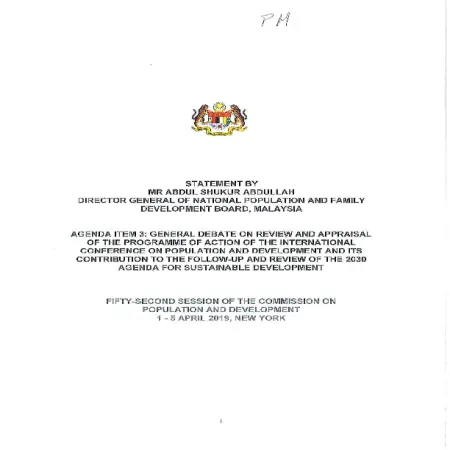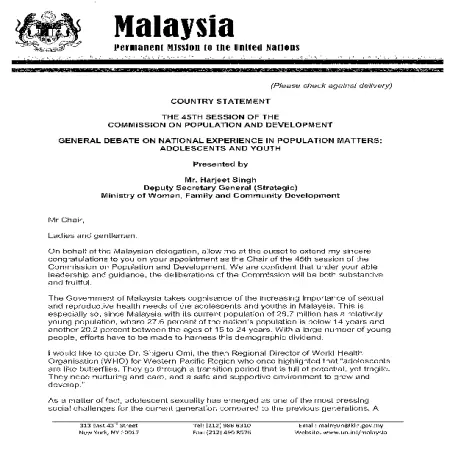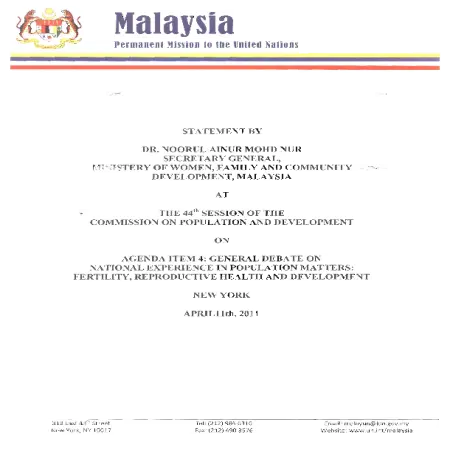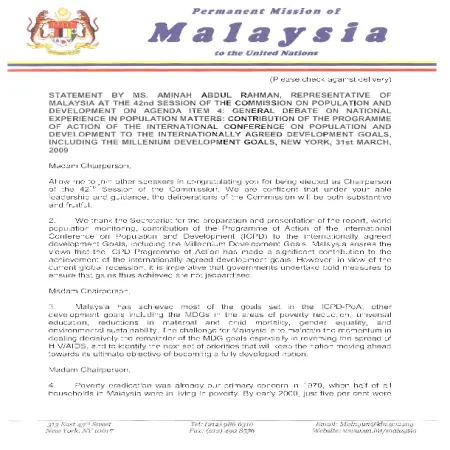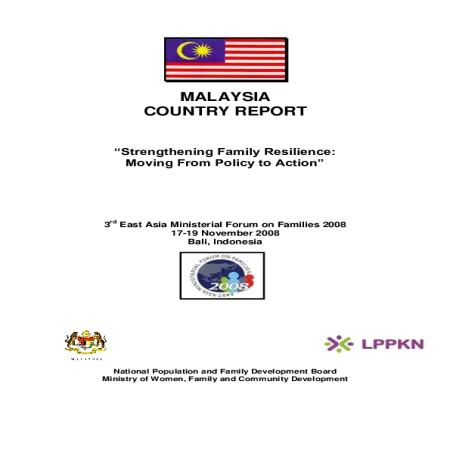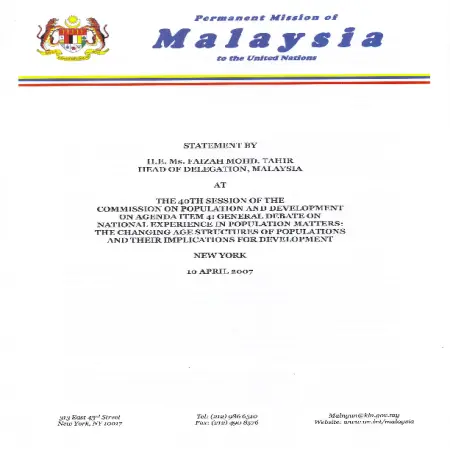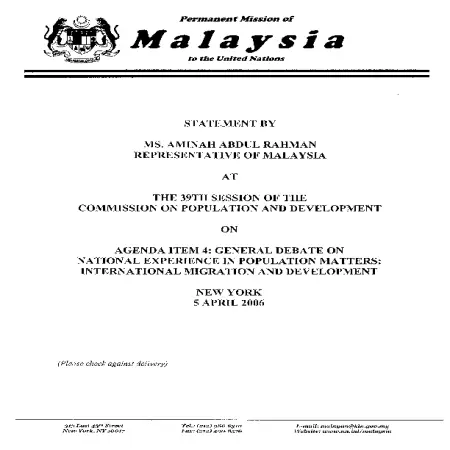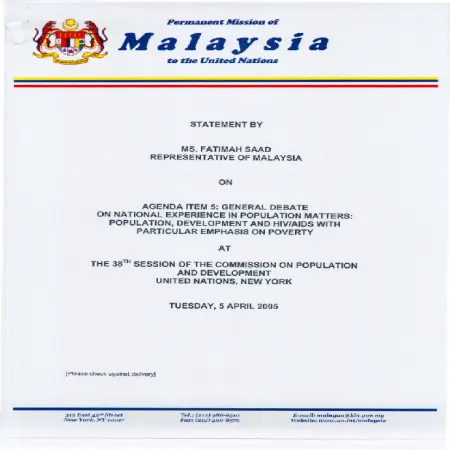Browse by Type
Results for Item type : "Country Statement"
Country Statement (20)
|
|
The 57th Session of The Commission On Population And Development, United Nations New York, 29 April – 3 May 2024
Item Type: Country Statement
Editor:
Year: 00/05/2024
Abstract: Malaysia like many other countries is becoming an aging nation due to declining fertility and increasing life expectancy. As 10.7 per cent of its population aged above 60 in 2020, Malaysia is expected to reach aged nation status by 2030. In this regard, Malaysia has revised its National Policy for Older Persons to enhance the integration of the elderly into society and introduced measures to boost the number of geriatricians and aged care health professionals under the National Health Policy for Older Persons. Malaysia's commitment to adolescent healthcare is evident in the National Adolescent Health Plan of Action (2015-2020) and the revised National Policy and Plan of Action on Social and Reproductive Health Education (2022-2025). These initiatives emphasize sexual and reproductive health education rooted in religious and moral principles across different settings and age groups. The Government also provides comprehensive health care services which includes contraceptive and sexual and reproductive health services that are integrated into primary health-care facilities nationwide. Family planning services are also provided by the National Population and Family Development Board of the Ministry of Women, Family and Community Development, NGOs such as the Family Planning Associations as well as private practitioners.
|
|
|
|
|
|
The 56th Session of The Commission On Population And Development, United Nations New York, 10-14 April 2023
Item Type: Country Statement
Editor:
Year: 11/04/2023
Abstract: Education is a longstanding right enshrined in human rights and developmental instruments, including in the Plan of Action of the International Conference on Population and Development (ICPD). The ICPD Plan of Action also recognizes the key role of education in sustainable development, as well as the responsibilities of different stakeholders, particularly parents, in this regard. Investments in education systems are of utmost importance for population growth, as it empowers people to lead better, healthier and sustainable lives. For Malaysia, the education system serves as a fundamental component in our quest to be a developed nation, and in achieving the Sustainable Development Goals (SDGs). Strengthening of human capital through education is a priority to Malaysia, with the Government providing free education to citizens up to secondary level.
|
|
|
|
|
|
The 55th session of the Commission on Population and Development United Nations, New York, 25-29 April 2022
Item Type: Country Statement
Editor:
Year: 00/04/2022
Abstract: Malaysia’s socio-economic development has been significant in transforming our economy from a low income to an upper-middle-income status. We have achieved significant progress in eradicating poverty and narrowing inequalities. However, the COVID-19 crisis has resulted in vulnerable households falling into poverty and hardship.
|
|
|
|
|
|
The 54th session of the Commission on Population and Development: general debate on population, food security, nutrition and sustainable development
Item Type: Country Statement
Editor:
Year: 21/04/2021
Abstract: Malaysia’s population currently stands at 32,760,284 and is increasing at the rate of 0.6 percent per annum. Increased population increases food demand. Annually, Malaysia spends approximately USD8.33 billion (RM34.5 billion) on import of food supply, pointing to increased dependency food import purchases.
|
|
|
|
|
|
The 52nd session of the commission on population and development:general debate on review and appraisal of the programme of action of the international conference on population and development and its contribution to the follow-up and review of the 2030 agenda for sustainable development
Item Type: Country Statement
Editor:
Year: 01/04/2019
Abstract: The population of Malaysia has increased more than three-fold from 10.5 million in 1970 to about 33 million today. the population was growing around 2.5 percent per annum for the period 1970-2000 but it has declined to 1.7 percent between 2010 and 2018.
|
|
|
|
|
|
The 51st session of the commission on population and development :general debate on sustainable cities, human mobility and international migration, New York
Item Type: Country Statement
Editor:
Year: 09/04/2018
Abstract: Malaysia has taken the initiatives to systematically coordinate sustainable urban planning and development, with emphasis on a balanced development; physically, environmentally, socially and economically, such as through the introduction of the Safe City Concept, and Go Green Kuala Lumpur Car-Free Morning.
|
|
|
|
|
|
The 50th session of the Commission on Population and Development: general debate on changing population age structures and sustainable development
Item Type: Country Statement
Editor:
Year: 00/00/2017
Abstract: This Country Statement address about four important sub-topics namely changing population age structures, fertility trends and initiatives, adolescents and youth as well as trends in working age population.
|
|
|
|
|
|
The 49th session of the Commission on Population and Development on agenda item 4: general debate on national experience in population matters: "strengthening the demographic evidence base for the post - 2015 development agenda", New York
Item Type: Country Statement
Editor:
Year: 00/00/2016
Abstract: The Department of Statistics Malaysia (DOSM) has been responsible for undertaking the Population and Housing Censuses of Malaysia every years since 1970. The Census remains the main source of data collection aimed at providing a comprehensive set of statistical
information about the population in the country in terms of its size and spatial distribution, its demographic, social and economic characteristics as well as housing stock at a specific time
reference. The census provides essential information not only for policy development and planning, but also for managing, monitoring and evaluating programs and activities across a broad spectrum of sectors. The 2010 Census round utilized improved ICT technologies and new approaches in the different phases of the census operation. The emerging technologies are transforming the way the Census is conducted in terms of operations management, quality assurance, data capture, mapping (GIS, GPS), data processing and storage. With the ever increasing individual privacy and accessibility of internet, the e-Census was introduced in 2010. An internet based questionnaire for data collection, was found to be more effective to capture respondents mainly in large urban areas and the gated communities.
|
|
|
|
|
|
The 47th session of the Commission on Population and Development on agenda item 4: general debate on national experience in population matters: assessment of the status of implementation of the programme of action of the international conference on population and development, New York, 8 April 2014
Item Type: Country Statement
Editor:
Year: 08/04/2014
Abstract: Malaysia shares the view that the current state of the world’s population is one of unprecedented diversity and change, reflected in new patterns of fertility, mortality, migration, urbanisation and ageing. The continuation and consequences of these population trends will present both opportunities and challenges for the formulation and implementation of the post-2015 development agenda and for the achievement of all internationally agreed development goals.
|
|
|
|
|
|
The 45th session of the Commission on Population and Development at the general debate on national experience in population matters: adolescents and youth, New York, 24th April, 2012
Item Type: Country Statement
Editor:
Year: 00/04/2012
Abstract: The Government of Malaysia takes cognisance of the increasing importance of sexual and reproductive health needs of the adolescents and youths in Malaysia. Since Malaysia with its current population of 28.7 million has a relatively young population, where 27.6 percent of the nation's population is below 14 years and
another 20.2 percent between the ages of 15 to 24 years. With a large number of young people, efforts have to be made to harness this demographic dividend.
|
|
|
|
|
|
The 44th session of the Commission on Population and Development on agenda item 4: general debate on national experience in population matters: fertility, reproductive health and development, 11th April, 2011
Item Type: Country Statement
Editor:
Year: 11/04/2011
Abstract: Fertility among Malaysian women is declining faster than expected due to the increase in the average age at first marriage for women that has risen from 24.7 years in 1991 to 25.3 in 2004. Malaysia's total fertility rate (TFR) is expected to reach the replacement level by year 2015. With more and more women participating in the labour force and prioritising career development, this has also led to many highly educated women choosing to marry late or not to marry at all.
Malaysia hopes to sustain the current fertility rate and not let it fall below replacement level. Sustaining the current TFR of 2.3 is one of the major challenges that has to be monitored as it can lead to contraction of labour supply, rapid aging of the population and other social implications.
|
|
|
|
|
|
The 4th East Asia Ministerial Forum on Families, "safe and resilient families: protecting and empowering at-risk and high risk families", Kuala Lumpur, 7-10 November 2010
Item Type: Country Statement
Editor:
Year: 00/11/2010
Abstract: A family is a living, evolving institution, affected by socio-economic factors as well as by the changes that shape the social environment in which it functions. More often, the changes and transformations have brought both gains and losses to family institutions. Hence, the challenge today is to reinforce positive changes and secure those in the new environment, and at the same time, to mitigate the negative consequences of changes, without dampening the momentum for positive evolution.
|
|
|
|
|
|
Malaysia country report at 4th East Asia Ministerial Forum on Families, "Safe and resilient families: protecting and empowering at-risk and high risk families", Kuala Lumpur, 7-10 November 2010
Item Type: Country Statement
Editor:
Year: 00/00/2010
Abstract: Malaysia recognizes the family as a natural and fundamental
social unit that provides valuable human resource and forms the
backbone for solidarity, security and nation building. Malaysia
believes in the importance of family development in line with the
objective of creating a caring society ; Family is PRIORITY NO. 1
|
|
|
|
|
|
The 42nd session of the Commission on Population and Development on agenda item 4: general debate on national experience in population matters: contribution of the programme of action of the international conference on population and development to the internationally agreed development goals, including the millenium development goals, New York, 31st March, 2009
Item Type: Country Statement
Editor:
Year: 31/03/2009
Abstract: Malaysia has achieved most of the goals set in the ICPO-PoA, other
development goals including the MDGs in the areas of poverty reduction, universal education, reductions in maternal and child mortality, gender equality, and
environmental sustainability. The challenge for Malaysia is to maintain the momentum in
dealing decisively the remainder of the MOG goals especially in reversing the spread of
HIV/AIDS, and to identify the next set of priorities that will keep the nation moving ahead towards its ultimate objective of becoming a fully developed nation.
|
|
|
|
|
|
Malaysian country report 3rd East Asia Ministerial Forum on Families 2008, "Strengthening family resilience: moving from policy to action"
Item Type: Country Statement
Editor:
Year: 00/11/2008
Abstract: Social policies and programmes affecting families have been revised and improved from time to time since Independence in 1957 to adapt to new challenges and needs of families. The importance of the family as a foundation for a strong Malaysia was first given prominence when Vision 2020 (now renamed the National Vision Policy–NVP) was announced in 1991 which strived to make Malaysia an industrialised nation by the year 2020. This vision recognizes that PEOPLE are the center of development and the critical element of this Vision is to produce citizens of good character embedded with an appropriate balance of suitable knowledge and skills and the inculcation of positive moral values, ethics and innovativeness. It particularly identified a “social system in which society will come before self, in which the welfare of the people will revolve not around the state or the individual but around a strong and resilient family system.”
|
|
|
|
|
|
The 3rd East Asia Ministerial Forum on Families, "Strengthening family resilience: moving from policy to action",Bali Indonesia ,17-19 November 2008
Item Type: Country Statement
Editor:
Year: 00/11/2008
Abstract: The family institution performs multifaceted functions in the development and well-being of its members. In order to enable the family institution to fulfill its societal roles and responsibilities, it requires support from the state, civil society and from family members themselves. In this regard, it is essential that we examine
social services policies from the family and not just from the individual
perspective and whether they contribute towards the strengthening of
family resilience. Effective support and protection to families and their
individual members requires that services respond appropriately to the
needs that exist at different stages of the family lifecycle and the individual
lifespan.
|
|
|
|
|
|
The 41st session of the Commission on Population and Development on item 4 : Population distribution, urbanisation, internal migration and development
Item Type: Country Statement
Editor:
Year: 08/04/2008
Abstract: Malaysia is currently experiencing an increase in population mobility mainly caused by industrialization and urbanization. Between 1970 and 2006, the proportion of population living in big cities (namely Kuala Lumpur, Penang and Johor Bahru) had doubled due to rapid urbanization mainly contributed by internal migration. Internal migration in Malaysia is gender, age and area selective, it is dominated by males mainly in the age group of 15 to 34 years, though female migration is expected to increase in the future.
|
|
|
|
|
|
The 40th session of the Commission on Population and Development on agenda item 4: general debate on national experience in population matters: the changing age structures of populations and their implications for development, New York, 10 April 2007
Item Type: Country Statement
Editor:
Year: 10/04/2007
Abstract: The transition from a regime of high mortality and high fertility to one of low mortality and low fertility in Malaysia is a relatively recent phenomenon. similar to the trends in many developing countries, the demographic transition in Malaysia is characterized by rapid declined in mortality and moderate declines in fertility. The crude death rate has drastically declines from a high of 20.0 in 1947 to a very low level of 4.5 deaths per thousand populations in 2006. Such a rapid declines was due to improvements in the health sectors and higher socio-economic development in the country.
|
|
|
|
|
|
The 39th session of the Commission on Population and Development on agenda item 4: general debate on national experience in population matters: international migration and development, New York, 5 April 2006
Item Type: Country Statement
Editor:
Year: 05/04/2006
Abstract: International migration, inter-alia, helps to ensure labour market flexibility and reduce labour market rigidity. At the same time, it must also be acknowledged that the impact of international migration, particularly low skilled foreign workers, on the receiving country's economy and society can be both positive and negative.
|
|
|
|
|
|
The 38th session of the Commission on Population and Development on agenda item 5: general debate on national experience in population matters: population, development and HIV/AIDS with particular emphasis on poverty, New York, 5 April 2005
Item Type: Country Statement
Editor:
Year: 05/04/2005
Abstract: The Government of Malaysia acknowledges the vast impact of the HIV epidemic on the demographic profile of the country. It affects population growth, distribution and structure. It impacts upon widowhood with the concomitant increase in orphans among children and in the reduction of the reproductive years resulting in lower fertility.
|
|
|
|









